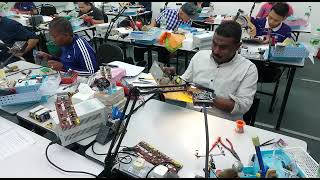
Power Supply Troubleshooting and Repair Tips
 Tips on Repairing SMPS power supplies without published schematics. Learn about the half bridge configuration. My Electronics Course on Patreon, Link Here: https://www.patreon.com/MrCarlsonsLab
Tips on Repairing SMPS power supplies without published schematics. Learn about the half bridge configuration. My Electronics Course on Patreon, Link Here: https://www.patreon.com/MrCarlsonsLab


Thank you *****
Hi, there. I’m from Iran. I know English but if u could enable subtitle on your wonderful trainings, it would be much better.🤩😍🥰
great video my Sony amp use this type of pulse power supply now i’m able to fix the problem thanks a lot
To learn more about electronics in a different and very effective way, and at the same time support this channel, go to Mr Carlson’s Patreon page, click here: https://www.patreon.com/MrCarlsonsLab
Mr. Carlson’s Lab looks like he is the commander of his electronic space lab command center. His commands on the subject will make any problems be afraid to crop up and flee.
I’ve got a fault on a Melcher LM 2000 mk ii, (dual 15 volt o/p). the output is “noisy” with the switching frequency (approximately 69khz) appearing at about 1.5 volts p/p, a series of fast rise time spikes followed by a short tail of ringing, ?
What is an isolation transformer? 😅
Very nicely explained the operation of SMPS. Sir, one of our power supply +-15V found burnt capacitor and the same was replaced. After replacement, the -15V is coming and draining off. What would be the issue? Kindly advise. Thanks
Excellent explaination! Excellent Pace!
What an Otaku person! I love you 😀
Ground and neutral are joined mostly in russia and post soviet countries, this is a dissaster safety wise with gnd and ground connected together in todays appliances. You need to have proper groundind not connected to mains neutral line. Else you just connected one of 230v wires to appliance exterior does it seem safe.
Thank you
Consider becoming a Muslim 🙂
When I see people who are helpful I remember the Prophet Muhammed peace be upon Him saying: "The best of people are those who are most beneficial to people."
Have a good day <3
Great video, I learnt a lot there. A question for you. When I power up my SMPS I get an initial voltage output of approximately 52 volts, but this steadily drops to 16 volts over a period of about 20 seconds. The specified output should be 94 volts. Can you provide any insight as to why it might be doing this? The SMPS is for a sub woofer.
Thank you.
I’m still relatively new to fixing things…
I got a TV that when turned on.. the power light blinks and seems to be in stand by mode.
It starts to do something but then goes back off.
I replaced the "video board"…
But same symptom…. guessing now it must be the power board
How would shorting the MOSFETs destroy them?
Thank you for the awesome video.
At 14:55, you said "Since 12 is in its off state…" Im assuming you really meant "on" or maybe I am just misunderstanding it. Nevertheless, you made me question whether my progress so far, was ever really progress to begin with after I saw your schematic xDDD
it’s is impossible to fine a .1mf capacitors 400volts how’s to to joint others capacitor to caused it’s just only .1mf
My god where do I start I build a lot of smps and the biggest issue is potentiometer burning out amd igbt sometime wear out
I must have missed this one ,just watched it and what a brilliant explanation,im quite new at this and if you cant understand something you tend to put it to one side watching this has put my brain into 2nd gear, regards from across the pond 👍🇬🇧
Great video – many thanks fopr the explnations and ‘scope pics
You can use a portable scope, running on a floating DC adapter or an AC powered scope with a ground cheater plug.. or just yank the earth ground prong out of the plug.
I thought the intro was filmed on a green screen for a second then realized you’re actually inside a space station pod.
Also make sure you safely short the big capacitors, they can hold a lethal charge.
Great video man 👌🏾
I float the oscilloscope so I don’t damage anything
My 12v power supply is no longer bringing 12v …..just 3v….how can I fix it please
What would cause the PSU to drop in voltage over time. I measured 20.4VDC under load and it was just low enough where one solenoid separated from others on the bus would not function. I increased the voltage at the pot, and monitored it over a few days, but I still don’t know why it dropped to begin with. The pot was not glued though….perhaps it moved due to vibration? I mean the pot was extremely sensitive when adjusting. That or the electrolytic caps are starting to die maybe?
The SG3524 ( Silicon General) PWM iC was first first invented by National Semiconductor ( LM3524) in the mid-1970’s. This PWM IC is a very old and thus cheap part and well understood.
Voyage to the bottom of the sea
Hi how can i find info about a transformer in a PSU? Im trying to find where a power supply is failling (its for an old discontinued automation computer, directlogic 305 plc) and there is a kind of transformer almost at the end of the circuit with a lot of pin (maybe 6+ each side) but i dont know what pin do what, but i know there is an output for 24v dc on the board and maybe there is other voltage for the rest of the system (maybe 9v 5v ). When i search the number printed on the yellow tape on the transformer, i found nothing on the internet ?? I only know wich pin is the positive input because the board input is either 120/240 v, goes through what i think is a first transformer (sorry not good with all the component term) but with my multimeter i see 120v ac is going in and 120v ac is going out, so problably to step down if i was using 240v, after there is a bridge rectifier, i think it is good because i have 120v dc after it on the +- pin (tell me if it can be faulty even if got a good voltage reading, because i dont have yet a multimeter that can test diode or capacitor) after there is a lot of capacitor, resistor and other stuff but i can follow the copper trace to the second transformer so the only pin i know is the 120v dc input, but dont know about all the other pin… there is also a kind of beeping noise ( like a little bird) but i dont know wich components make that sound and if it is the faulty one or not. When i unplug everything the sound is fadding slowly, maybe the time to drain capacitor… how can i test a transformer without knowing the pinout ?
Please make a video on washinc machine pcb details
I wish I had the courage to work with HV applications like this since I do a lot of PC building and repair. I trust physics but not my interpretation lol.
I don’t get the point of the BR1. Is it part of the feedback circuit? I just don’t understand why they would inject another rectifier into the circuit right at the end there.
Could you repair the new technology electronic for YouTube channel.
would like to see captions/ /
i need to read because tired of wearing earpones ans the room needs to be silent where i am
/
/
/
/
/
/
You help me,alot bro.thanks
There is no power supply when it is brown out or black out!!!
It will be dark hahaha especially when there are disasters!!!
😂😂😂😂😂😂😂😂
Man, what a "lab".😅😅
The "dead time" prevents cross conduction and shorting the transistors out. The fuse won’t protect the circuit it is too slow and won’t protect the drive transistors. Most instances the transistors will short out due to excessive heat buildup thus causing thermal runaway.
Thanks
This was excellent especially the safety issues wrt testing with any device that operates from a mains supply.
Curiosity question: Why does T1 use two secondary windings when it appears that one would work?
Thank your very much for your lessons!
Silicone/ glue on a pcb sucks donkeyballs………
Could one also use differential probes instead of a isolation transformer?
Please I need more lecture on this will you like to train me on it
Bro’s recording from ISS
修电子产品还得看中国人速度!这种电源修理时,先看有没有烧焦,再测电阻,先电管再小管,再试SC3524电源引脚,半小时很修完,不用示波器。